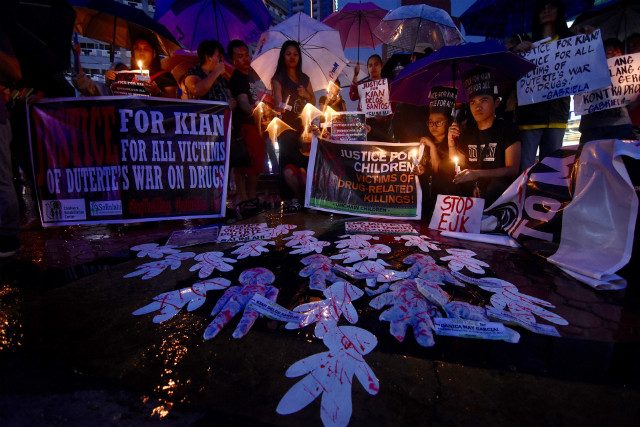SUMMARY
This is AI generated summarization, which may have errors. For context, always refer to the full article.

MANILA, Philippines – The Commission on Human Rights (CHR) on Sunday, September 24, criticized the Philippine government’s refusal to accept recommendations by United Nations (UN) member-states against “the most serious human rights violations” in the country.
While it is expected that the government “would do its level best to reflect a positive tack to the adoption” of some recommendations, CHR Chairperson Chito Gascon lamented that the move to reject key measures is a step back in the fight to uphold human rights.
“If they are serious in making progress for human rights, the government must reconsider its decision to reject or merely take note of the other recommendations and instead unequivocally accept them,” he told Rappler in a text message.
On Friday, September 22, the Philippines rejected more than half of the recommendations on the human rights situation in the country during the 36th session of the UN Universal Periodic Review (UPR) in Geneva, Switzerland.
The country only accepted 103 recommendations and took note of the remaining 154. Among those rejected were requests to allow UN special rapporteur Agnes Callamard to visit the Philippines and investigate, as well as calls for probes into the extrajudicial killings happening under President Rodrigo Duterte’s war on drugs.
The Philippine delegation insisted that “these are deaths arising from legitimate law enforcement operations or deaths that require further investigation following the established rules of engagement by the country’s law enforcers.”
Duterte’s anti-drug campaign has been criticized by local and international institutions for alleged human rights violations. It has so far yielded more than 3,500 deaths in police operations, while the number of people actually killed by vigilantes is still being debated. (READ: CHR: Death toll in drug war higher than what gov’t suggests)
Full transparency
Foreign Secretary Alan Peter Cayetano said the adoption of the report shows that the Philippines “has nothing to hide with its human rights record.”
He added that the country “will remain resolute in its respect for and protection of human rights as it strives to improve the lives and welfare of each and every Filipino by protecting them from the scourges of drugs and criminality.”
Cayetano also earlier said in a speech before the Asia Society Policy Institute that Duterte’s drug war is a “rule of law campaign” because it is “aimed at taking out power from drug lords and narcopoliticians.”
Malacañang, meanwhile, said the adoption of some recommendations “affirmed [the government’s] respect for the dignity of the Filipino people and the protection of the Filipino family.”
But Gascon said that if the government is sincere in trying to uphold human rights, there should be further transparency in investigations into drug war killings.
“If the Department of Foreign Affairs intends to show its sincerity to the international community with regards to the State’s human rights obligations it must now take steps to operationalize President Duterte’s invitation to allow long-term human rights monitors into the country and ensure that the costs of maintaining the same are adequately provided for,” he said.
Gascon also reiterated the CHR’s previous request for “full transparency and cooperation” in investigations, particularly allowing “free and unhindered” access to case folders pertaining to deaths in the war on drugs.
Created via the 1987 Constitution, the CHR is tasked to investigate allegations of human rights abuses by state actors such as the military or police. (READ: Things to know: Human rights in the Philippines)
The commission, however, has been facing challenges in its investigations into drug-related killings – particularly as Duterte ordered authorities not to share case folders with CHR investigators. – Rappler.com
Add a comment
How does this make you feel?
There are no comments yet. Add your comment to start the conversation.